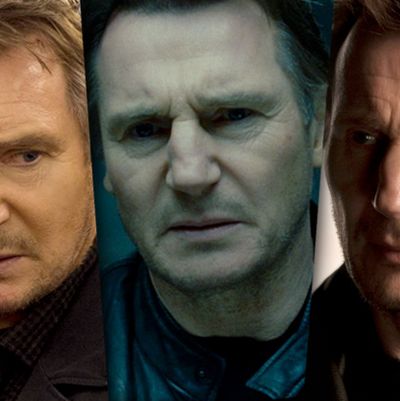
“I will find you and I will kill you.” For Liam Neeson, 2009’s Taken was a career rebirth that gave him a coherent persona after decades of hard work with no clear through line. The actor thought the trashy film would end up going straight to DVD, and initial response to its trailers and premise — respected thespian slums it like Charles Bronson — trended toward incredulous giggles. An unexpected hit, to the tune of $225 million worldwide, it was a catalyst for more of the same.
Neeson’s dip into the “tough old man” genre has extended to six movies, little more than a fourth of the staggering 21 movies the actor’s been in since 2009. It’s a diverse body of appearances — witness his recent, admirably goofy appearance in The LEGO Movie. But those action vehicles have come to define his career, and this weekend’s Non-Stop is the logical culmination of the Neeson persona, a combination of toughness and familial obsessiveness.
The six-foot-four Neeson is entering his sixth decade, and has the frame and musculature to credibly unleash mayhem (he does his own fights, though not his non-fighting stunts). Like Death Wish–era Bronson, Neeson’s characters are forced by circumstance to exact revenge, breaking bones and barking threats. Vocally, he’s settled into an instantly definable, impersonator-ready bag of tricks, sighing heavily before forcing a response out in a deep-voiced rumble that sounds like a combination of Daniel Plainview and Christian Bale’s Batman. And just like Bronson, he never once makes a mistake about whom to hurt, all while taking just a little too much pleasure in it.
Taken has all the important character DNA that recurs in Neeson’s macho parts: protagonist Bryan Mills has problematic family relations (he’s estranged from his ex-wife and daughter) and is warily aware of all the horrible things that can occur in this awful world. His barely concealed tetchiness abruptly increases to a full shout with no modulating transitional phase, a suitably jarring analogue to his quick-and-dirty fighting style. Violence emerges from an obvious place of internal hurt: When Neeson’s eyes go from sad puppy to angry puppy, that’s when you know it’s on.
With that winningly reactionary template set, the challenge for Neeson’s career has been how to keep from beating this most sellable side of his persona into the ground. 2010’s The A-Team has no answer to this dilemma: Neeson probably wouldn’t have been in the running to inherit the role of squad leader Hannibal if not for Taken, but the statement that he’s no George Peppard (ludicrous to say, of course — we’re talking about George Peppard) is the plain truth. The trademark cigar’s in place and that’s it. Avoiding the macho belligerence of Taken, Neeson replaces it with nothing. (Ditto 2012’s Taken 2, a bland and comparatively family-friendly retread in which the actor sleepwalks through the obligatory running and jumping rather than taking glee in it.)
The A-Team was the first film Neeson made with Joe Carnahan, one of contemporary Hollywood’s most unrepentantly macho writer-directors (appropriately, he wrote a Death Wish remake). They reteamed for 2012’s The Grey, which was misleadingly promoted with trailers that emphasized the absurdist spectacle of Neeson punching a wolf. It was a bait-and-switch tactic: The film is actually a somber “meditation” on confronting death in a godless world via a story about manly men who have to survive after their plane crashes in the Arctic. There are some typically shouty, belligerent moments (Neeson warns a fellow survivor that misbehavior will prompt him “to start beating the shit out of you in the next five seconds”) and familial problems (it opens with the actor writing a suicide note to his wife), but here Neeson’s survival instincts do uneasy battle with the lust for self-annihilation. In the film’s closing seconds, he does prepare to fight that wolf, but all the bluster is a cover for crippling angst.
In between The A-Team and The Grey, Neeson made 2011’s Unknown, the best film of his aggression-driven renaissance thus far. The marketing was again misleading, implying an entire movie’s worth of various Germans being punched by a shouting madman. The story’s innocent-man-in-jeopardy plot, though, actually requires him to be polite and run around Berlin while trying to figure out why exactly he’s in danger. He goes nearly the entire film without decking anyone, and when he yells at a hotel concierge, he’s shut down cold by the man’s Teutonic politesse. This ugly American isn’t powerful; he’s a pest, a reflexive bully who isn’t going to be accommodated.
Non-Stop reteams Neeson with Unknown director Jaume Collet-Serra, and the movie again actively toys with his Taken persona. As air marshal Bill Marks, the movie opens with Neeson balefully glaring at nothing in particular and growling “I cannot stay in London for three days” over the phone as if threatening instant dismemberment. When he walks through the airport, the camera assumes his gaze and all he sees are potential threats everywhere: an Arab passenger here, a white man angrily staring at said passenger there, both equally problematic.
His stability and methods are questioned in a way that’s near meta, given Neeson’s current movie persona, but in the end, Marks is fully vindicated. As in Taken, Marks misses his 17-year-old daughter, channeling his separation pains into neck-snapping action. Trying to find an onboard hijacker by bullying passengers, his dialogue is very much of the authoritative command kind, complete with ludicrously over-the-top threats (“Answer me or I will break your arm”). His behavior appalls the passengers, who try to revolt, and his superiors on the ground tell him to stand down. “A man in a dangerous psychological state,” he’s called, but in the end he (of course) gets his man and saves everyone. “I don’t have time for the law,” he snaps — and he’s absolutely right! Never doubt a vigilante to keep his promise: He’ll find you and kill you no matter the year.

